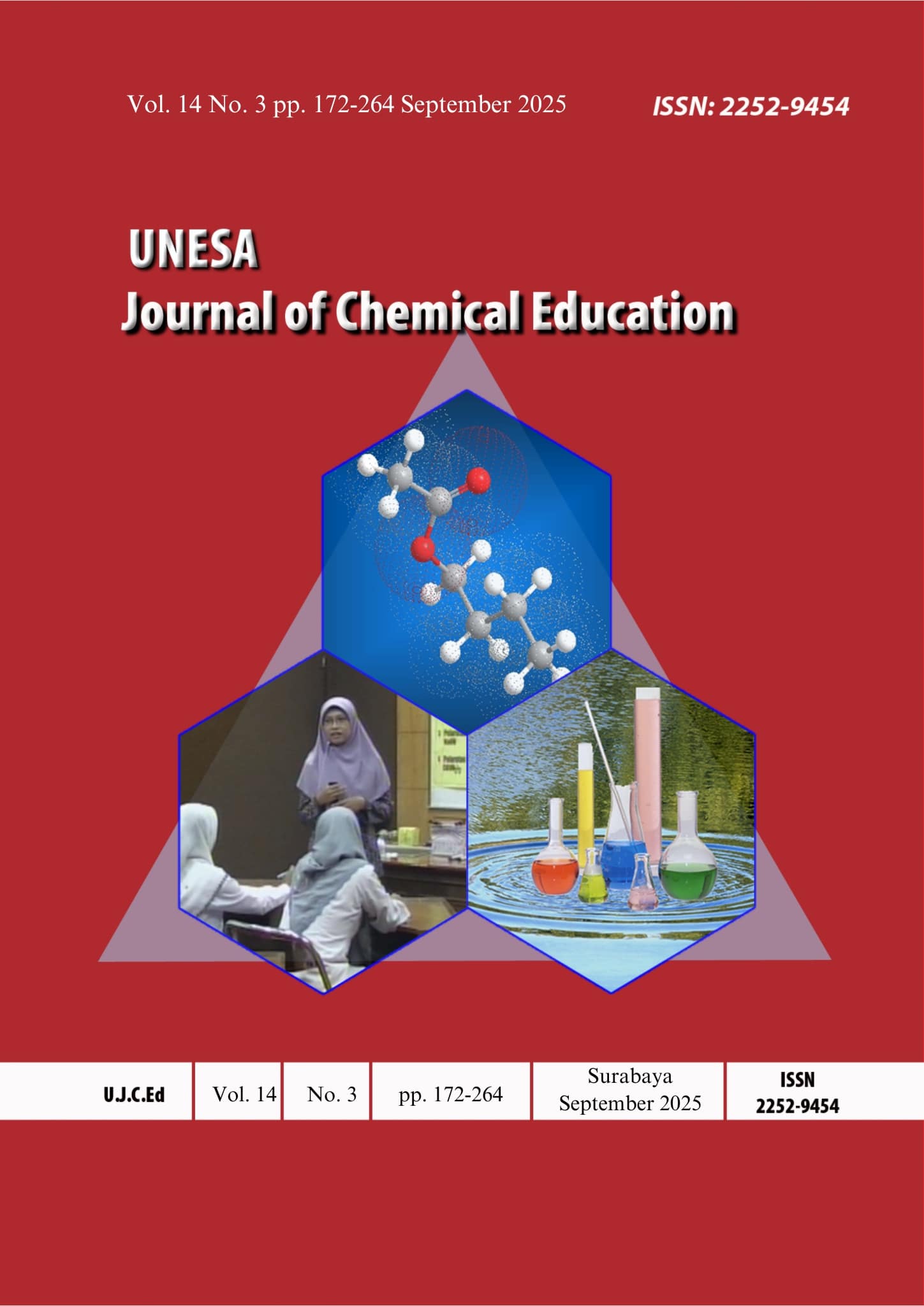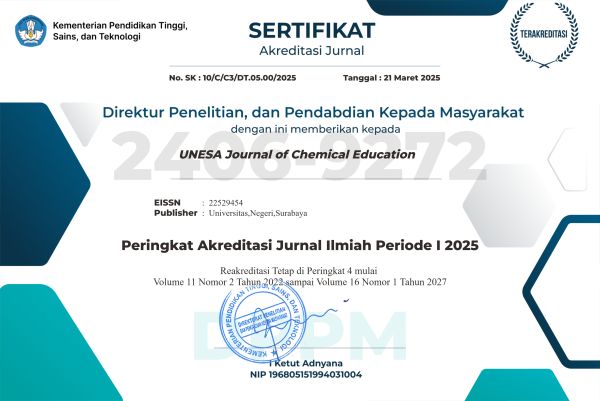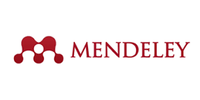IMPLEMENTATION OF GUIDED INQUIRY LEARNING WITH SOCIO-SCIENTIFIC ISSUES CONTEXT TO STUDENTS' CRITICAL THINKING SKILLS ON BUFFER SOLUTION MATERIAL
DOI:
https://doi.org/10.26740/ujced.v14n3.p202-209Keywords:
Socio Scientific Issue, Guided Inquiry Learning, Critical ThinkingAbstract
This study aims to determine the effect of the application of guided inquiry learning model with Socio-Scientific Issues (SSI) context on students' critical thinking skills on buffer solution material. This study used a pre-experiment design type one group Pre-Test Post-Test with the subject of 30 students of class XI MIPA 6 SMA Laboratorium UM Malang. The measurement instrument was a reasoned multiple choice test to measure students' critical thinking skills. Data were analyzed using normality test, homogeneity, N-Gain analysis, and Wilcoxon test. The results showed an increase in the average Post-Test score by 36.48 points from the Pre-Test. The N-Gain value showed an increase in the medium (56.67%), low (40.00%), and high (3.33%) categories. Guided Inquiry Learning syntax cinsisting of Problem Orientation, Problem Formulation, Hypothesis Formulation, Investigation, Data Analysis, and Conclusion Drawing proved effective in encouraging students’ critical thinking skills. SSI contexts such as betel nut phenomenon provide contextual stimulus that helps students to be able to connect chemistry concept with their daily life and also strengthens students’ analysis and reflection in chemistry learning The Wilcoxon test results produced a significance value of 0.000 (p < 0.05) which means there is a significant difference between the Pre-Test and Post-Test. GIL syntax consisting of problem orientation, problem formulation, hypothesis formulation, investigation, data analysis, and conclusion drawing proved effective in encouraging students' critical thinking skills. SSI contexts such as the betel nut phenomenon provide contextual stimulus that strengthens students' analysis and reflection in chemistry learning.
Downloads
References
Partnership for 21st Century Skills Ohio Department of Education. 2007. Partnership For 21st Century Skills-Core Content Integration. www.P21.org. Accessed January 24, 2025.
Sudirman, Anggraeni, S., Marlinda, N. L. P. M., Silalahi, E. K., Fitrian, A., Siregar, H. T., Br Pa, R. H., Azizah, N. N., Hidayat, Saputri, M., Wirda, Nasrianty, and Karim, S. 2023. Implementasi Pembelajaran Abad 21 Pada Berbagai Bidang Ilmu Pengetahuan. Bandung: Media Sains Indonesia.
Ennis, R. H. 1962. A Concept of Critical Thinking a Proposed Basis for Research in the Teaching and Evaluation of Critical Thinking Ability. Cambridge.
Lai, E. R. 2011. Critical Thinking: A Literature Review Research Report. London: Pearson.
Sutiani A., Situmorang M., and Silalahi A. 2021. Implementation of an Inquiry Learning Model with Science Literacy to Improve Student Critical Thinking Skills. International Journal of Instruction. Vol. 14, No. 2, pp. 17–38.
Rushiana, R. A., Sumarna, O., and Anwar, S. 2023. Efforts to Develop Students’ Critical Thinking Skills in Chemistry Learning: Systematic Literature Review. Jurnal Penelitian Pendidikan IPA, Vol. 9, No. 3, pp. 1425–1435.
Dusturia, N., Nurohman, S., and Wilujeng, I. 2024. Socio-Scientific Issues (SSI) Approach Implementation in Science Learning to Improve Students’ Critical Thinking Skills: Systematic Literature Review. Jurnal Penelitian Pendidikan IPA, Vol. 10, No. 3, pp. 49–57.
OECD. 2023. PISA 2022 Results Factsheets Indonesia. OECD Publishing.
Rahmi, Y. L., Alberida, H., and Astuti, M. Y. 2019. Enhancing Students’ Critical Thinking Skills Through Inquiry-Based Learning Model. International Journal of Physics: Conference Series, Vol. 1317, pp. 1–6.
Fernanda, A., Haryani, S., Tri, P. A, and Hilmi, M. 2019. Analisis Kemampuan Berpikir Kritis Siswa Kelas XI pada Materi Larutan Penyangga dengan Model Pembelajaran Predict Observe Explain. Jurnal Inovasi Pendidikan Kimia, Vol. 13, No. 1, pp. 2326–2336.
Pasaribu, S. E., Atifah, Y., Helendra, and Ristiono. 2020. Perbandingan Kemampuan Berpikir Kritis Siswa SMP yang Diajar Dengan Model Problem Based Learning dan Discovery Learning. Jurnal Mimbar Ilmu, Vol. 25, No. 3, pp. 460–469.
Ijirana, Aminah, S., Supriadi, and Magfirah. 2022. Critical Thinking Skills of Chemistry Education Students in Team Project-Based STEM-Metacognitive Skills Learning during The Covid-19 Pandemic. Journal of Technology and Science Education, Vol. 12, No. 2, pp. 397–409.
Wulandari, D. S., Prayitno, B. A., and Maridi, M. 2022. Developing the Guided Inquiry-Based Module on the Circulatory System to Improve Student’s Critical Thinking Skills. JPBI (Jurnal Pendidikan Biologi Indonesia), Vol. 8, No. 1, pp. 77–85.
Oktavia, L. M., Syahri, W., and Asmiyunda. 2025. Pengembangan e-LKPD Larutan Penyangga Berbasis Guided Inquiry untuk Meningkatkan Kemampuan Berpikir Kritis Peserta Didik. Journal on Education, Vol. 7, No. 2, pp. 12771–12784.
Kaltakci, D., and Oktay, O. 2011. Guided-Inquiry Laboratory Experiment to Reveal Students’ Comprehension of Friction Concept: A Qualitative Study. Balkan Physics Letters, pp. 180–190.
Mahanani, I., Rahayu, S., and Fajaroh, F. 2019. Pengaruh Pembelajaran Inkuiri Berkonteks Socioscientific-Issues Terhadap Keterampilan Berpikir Kritis dan Scientific Explanation. Jurnal Kependidikan, pp. 53–68.
Eastwood, J. L., Sadler, T. D., Zeidler, D. L., Lewis, A., Amiri, L., and Applebaum, S. 2012. Contextualizing Nature of Science Instruction in Socioscientific Issues. International Journal of Science Education, Vol. 34, No. 15, pp. 2289–2315.
Sadler, T. D. 2004. Informal Reasoning Regarding Socioscientific Issues: A Critical Review of Research. Journal of Research in Science Teaching, Vol. 41, No. 5, pp. 513–536.
Högström, P., Gericke, N., Wallin, J., and Bergman, E. 2024. Teaching Socioscientific Issues: A Systematic Review. Science & Education.
Qamariyah, S. N., Rahayu, S., Fajaroh, F, and Alsulami, N. M. 2021. The Effect of Implementation of Inquiry-based Learning with Socio-scientific Issues on Students’ Higher-Order Thinking Skills. Journal of Science Learning, Vol. 4, No. 3, pp. 210–218.
Sakamoto, M., Yamaguchi, E., Yamamoto, T., and Wakabayashi, K. 2021. An Intervention Study on Students’ Decision-Making Towards Consensus Building on Socio-Scientific Issues. International Journal of Science Education, Vol. 43, No. 12, pp. 1965–1983.
Schenk, L., Hamza, K., Arvanitis, L., Lundegård, I., Wojcik, A., and Haglund, K. 2021. Socioscientific Issues in Science Education: An opportunity to Incorporate Education about Risk and Risk Analysis? Risk Analysis, Vol. 41, No. 12, pp. 2209–2219.
Dora, F., Afandi, A., Besse, T. A., Artika, W., and Titin, T. 2024. Pengaruh Model Guided Inquiry disertai Socioscientific Issues terhadap Keterampilan Berpikir Kritis Siswa. JPSP (Jurnal Penelitian Sains dan Pendidikan), Vol. 4, No. 1, pp. 95–107.
Rahmani, N. S. 2020. Pengembangan Instrumen Tes Keterampilan Berpikir Kritis Siswa SMA pada Materi Larutan Penyangga dalam Konteks Problem Solving. Bandung: Universitas Pendidikan Indonesia.
Sanjaya, W. 2006. Strategi Pembelajaran Berorentasi Standar Proses Pendidikan, Jakarta: Prenada Media.
Meltzer, D. E. 2002. The Relationship Between Mathematics Preparation and Conceptual Learning Gains in Physics: A Possible “Hidden Variable” in Diagnostic Pre-Test Scores. Americam Journal of Physics, Vol. 70, No. 12, pp. 1259–1268.
Putra, I. M. T. P. 2022. Kajian Literatur Sistematis: Integrasi Model Inkuiri Berbasis Socioscientific Issues pada Pembelajaran IPA. Jurnal Pendidikan MIPA, Vol. 12, No. 3, pp. 919–928.
Nareswari, Farera, K. P., Arianingrum, R. 2024. The Socioscientific Issues Approach in Chemistry Education: A Literature Study and Its Implication. Jurnal Pendidikan MIPA, Vol. 25, No. 4, pp. 1880–1892.
Downloads
Published
Issue
Section
License
Copyright (c) 2025 UNESA Journal of Chemical Education

This work is licensed under a Creative Commons Attribution-NonCommercial 4.0 International License.
The license terms of the Creative Commons Attribution-NonCommercial 4.0 International (CC BY-NC 4.0) requires attribution to the original creator, permits non-commercial use, and does not allow for the application of legal or technological restrictions on others' use.
 Abstract views: 48
,
Abstract views: 48
, PDF Downloads: 44
PDF Downloads: 44













